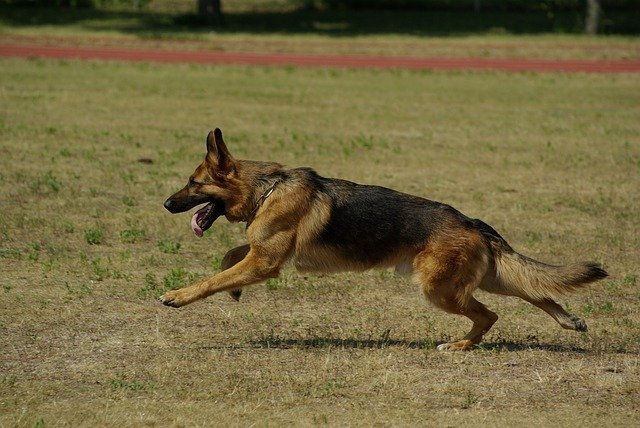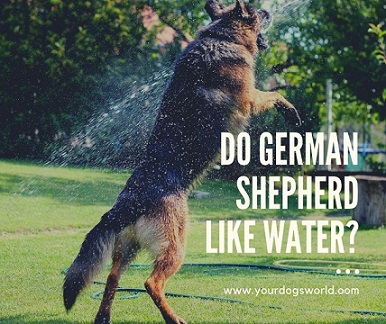The German Shepherd is known to be a guard dog. But, people are opening up to the idea of keeping one as a companion dog. So, when wanting to include a German Shepherd in family activities, the question “do German Shepherd like water”, comes up.
So do German Shepherd dogs like water and can they swim?
Some German Shepherds like water and like to swim while others hate water.
This is because each dog is different and swimming capability depends on their bringing up. It also depends on their exposure to water during puppyhood.
Can German Shepherd Swim? Do They Like To Swim?
As is the case with all dog breeds, some dogs love to swim while others hate it. So the question of ‘can a German Shepherd swim’ actually varies from dog to dog.
If a dog is exposed very early on to water, it is more likely that he will learn to swim and accept water.
But, unwillingness to swim or even make contact with water can be due to a past traumatic experience. The best is to let your German Shepherd puppy have a safe water experience early on.
Is your puppy teething? Read all about German Shepherd puppy teething.
Factors that make German Shepherds Good Swimmers
For those German Shepherds who know how to swim and love it, there are certain reasons backing their ability to swim.
Long Legs
A dog with long legs should automatically qualify as a great swimmer, right? But, this is not always the case. If by chance your German Shepherd does take a liking to swimming, his long limbs will be a welcomed asset.
German Shepherds are large dogs and should swim with ease. Find out how big do German Shepherds get?
Double Coat
A double coat is great since it acts as a water repellent coating that makes the swimming process a bit more enjoyable. A dog may not have to get soaked all the way through and feel cold if he has a double coat.
Lean Body
The German Shepherd breed in general has a lean and athletic build. This can be an advantage and a reason why this dog has a chance of being a great swimmer. A lean dog can easily use his power to manage his weight in the water and out!
Long Snout
How does a long snout make a dog a better swimmer?
Actually, a long snout assists a dog by letting him easily get air while swimming. This means he can continue paddling for longer without tiring out.
Dogs with shorter snouts struggle to breathe properly and risk drowning. Examples are the Pug and French Bulldog.
German Shepherds Aren’t Natural Swimmers!
Historically, German Shepherds were a breed whose role was herding and protecting livestock. They eventually became popular as guard dogs. That said, their purpose never involved water or swimming.
So, despite being physically equipped for swimming, it’s just not in their DNA to be a perfect swimmer!
The German Shepherd breed is not one we commonly associate with water as they were not bred to be in the water. But, a good example of dog breeds comfortable with water is Labrador Retriever and Poodle.
Sure you can try to train your German Shepherd to swim. But, success is not guaranteed! There is a 50/50 chance it will work out. And if it doesn’t work out, your dog will not exactly want to go anywhere near water!

Is It Possible To Teach A German Shepherd To Swim?
If you see it as a life skill that your German Shepherd must have, you can teach him to swim. But, be warned you should start early. Start teaching and exposing your German Shepherd puppy to water to get him familiar with the feeling.
The older a dog gets, the harder it is to train! Below are ways to train your GS to swim.
There are ways to make your German Shepherd more tolerant of water. You can even make him a swimmer or better swimmer with enough practice and attention.
While this can be done with the help of a professional dog trainer, it is better if you, his owner, do it.
This is because it helps you to form an unbreakable bond with your dog.
Here are the steps you can take to teach your dog how to swim.
1) Lead By Example
The first way to entice your dog into the water is by leading by example. Get into the pool and have fun! Automatically, your dog will feel like he is missing out on something amazing, which he is.
Although he will feel insecure and unsure at first, he is bound to take the leap of faith for his owner. Be slow and patient so that he can follow suit after you.
2) Start Off In The Shallows
If you are expecting your dog to join you in a pool or lake, start off in shallow water. Ideally, you should let him start off in water shallow enough to stand in. Then gradually as his confidence grows, you can start making him a bit deeper.
Don’t take it too fast as this could cause him to have a traumatic incident. Once this happens it could scare your German Shepherd off!
Regaining his trust and confidence could prove to be tough if this does happen.
3) Floating Jacket/Vest
Many pet parents swear by the inflatable vest. Besides being a great safety measure it also helps your dog gain swimming confidence faster. This vest will help your dog to stay afloat which is great if he has graduated to deeper water.
Dogs will instinctively start to paddle as soon as they are in water deep enough to float.
Floating dog vests are available in many online stores and can be picked up for minimal prices. If your dog is afraid of water, it is best to get him a floatable vest from the start.
4) Treats Are A Great Incentive
Dogs love treats and this works to your advantage! Use treats to entice him into joining you in the water. Also, go ahead and reward him when he gets it right and successfully manages to paddle a bit.
Make sure you make him understand how to get treats. For this to happen, you need to reward him at the right time.
5) Cheer Him On!
A dog performs best when he is being cheered on by his favorite human! Use verbal praise as a form of motivation for your dog.
Go ahead and let him know that he can do it, and surely he will! Use familiar terms like ‘good boy’ as he will respond best to these welcoming words.
6) Take Breaks!
Long and exhausting swim lessons will not sit well with any dog! Be sure to take enough breaks and make sure your dog is fed and hydrated.
Also, don’t pressure your dog into overexerting himself. A relaxed dog makes a better student and is more likely to succeed!
If the swimming lesson is not going well, pack up and try the next day!
Yes, German Shepherds undergo intensive training for guarding. But, you should not try to use the same technique for swimming lessons.
Choose Your Water Body Wisely!
If you are going to be making your German Shepherd swim, choosing the right water is important. This is because different water types can affect your dog differently. The wrong type of water can even pose a threat to your Shepherd’s health.
Freshwater
Freshwater happens to be the safest water to let your German Shepherd swim in. During swimming, especially during training sessions, your dog is likely to swallow a lot of water.
While freshwater does not immediately pose threats, rare chances of health issues do exist.
Still, freshwater fares much better in terms of safety when compared to saltwater and Chlorinated water. You can openly opt to play water sports games with your German Shepherd in freshwater.
Chlorinated Water
Chlorine is famous for affecting a dog’s skin and even makes their eyes red! This is not good news and if you plan on letting your GS swim in a pool, a mild pool cleaner is best. There is no way to compromise on this!
Yes, it is understandable that your pool must be kept clean and chemicals are the best way to accomplish this. But, unfortunately, chemicals and dogs do not make such a great team.
Some mild or natural ingredient-based pool cleaning solutions are best. Pet-friendly pool cleaning products are available in the market as well.
Saltwater
Letting your German Shepherd swim in salt water is perhaps the worst decision you can possibly make.
Saltwater can cause dehydration, seizures, or even brain swelling in your dog. Since saltwater water bodies are oceans, this means that your dog will struggle to swim against the current of the water.
Playing games like fetch in salt water and chlorinated water is also a bad idea! You should avoid it and instead put a backyard pool of freshwater.
Beware! Precautions to take After Swimming
Swimming isn’t always a safe experience for dogs. Sometimes there are risks that accompany this supposedly ‘fun’ activity! Occasionally, these risks can cause moderate to severe health complications. This could end in expensive health bills or even tragedy.
It is best to be aware of the risk beforehand. Here are some risks:
Water in Ears
Water in your dog’s ear is not a good thing. It may seem like just a minor issue but it can turn into a concerning issue requiring a vet.
A dog’s ear is not meant to stay wet for long. This is especially true for the German Shepherd who has long ears that have a deep ear canal.
Wet ear canals act as a favorable place for bacteria to thrive. Eventually, your German Shepherd will develop an ear infection that poses a threat to his health and hearing.
Toxins in Water
Toxins and poisonous bacteria are not always present in freshwater bodies. But, their presence cannot be ruled out completely unless the government or animal associations have tested and approved the site for swimming.
One example of dangerous bacteria is cyanobacteria. Symptoms of this are:
- Vomiting
- Diarrhea
- Loss of appetite
- Weakness
- Depression
- Lethargy
Water Animals
Freshwater bodies may have more than just fish inside them. Other aquatic life could pose a threat to your German Shepherd. Be sure to get in yourself and assess how safe the water is for your furry friend.
FAQs
No, German Shepherds are not huge fans of rain. They would much rather prefer to stay dry and warm than damp.
Being a double-coated dog breed, German Shepherds are bound to shed a lot. Seasonal shedding is an intense period of shedding where the double coat thins out to accommodate weather changes.

